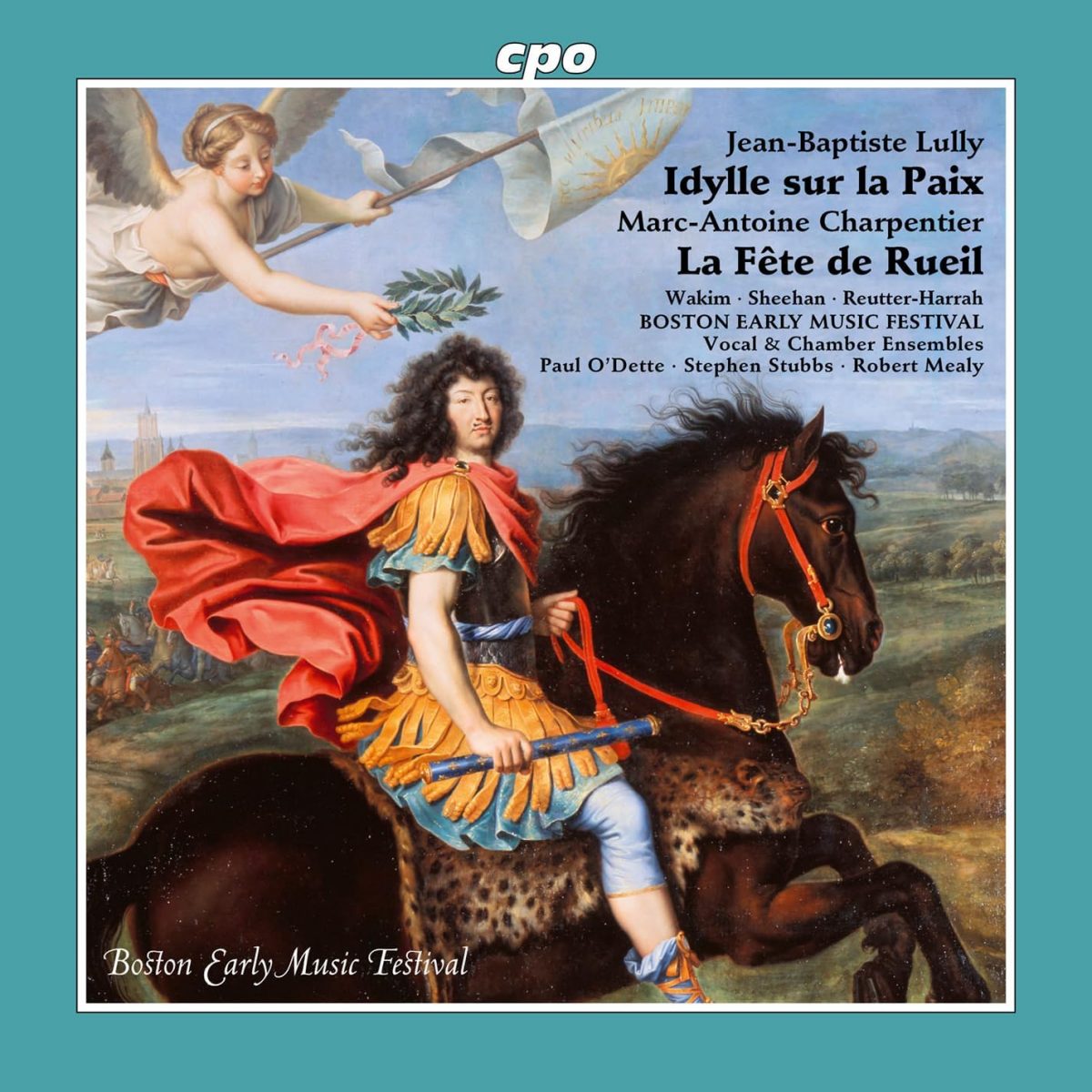Boston Early Music Vocal & Chamber Ensembles, directed by Paul O’Dette & Stephen Stubbs
75:50
cpo 555678-2
During the 17th and 18th centuries, it was customary to celebrate a major peace treaty or important victory with both sacred and secular music, in the case of the former a Te Deum, often freshly composed. Meanwhile, poets and composers would occupy themselves producing an ode in praise of the victor, or less frequently, a dramatic work crafted for the occasion. The present disc presents secular works from both these categories by the leading French composers of the 17th century, Jean-Baptiste Lully and Marc-Antoine Charpentier. Both were written to celebrate the same event, the Truce of Ratisbon (or Regensburg), which brought an end to the war Louis XIV had fought against the Holy Roman Empire and Spain. Signed in 1684, the Truce initiated what would be a short-lived period of peace that would be widely celebrated in a France increasingly wearied by Louis’s military exploits.
Such occasional works by their very nature present difficulties for modern performers and audiences. Laudatory and often sycophantic in the extreme, there is often little literary interest or emotional content to grasp. Lully’s Idylle sur la Paix is in this respect rather different in that it has a text written by no less than Jean Racine, which if not major Racine is by definition superior to the dozens of such texts churned out by hacks. The occasion of the lavish first performance of the Idylle was a fête attended by the king and his court and given by the Marquis de Seigneley in the orangery at his château at Sceaux, near Versailles in July 1685. Contemporary accounts – several quoted in Gilbert Blin’s long historical note in the booklet – testify to the glittering grandiosity of the occasion. What is not clear is the kind of forces likely to have been employed, but it seems unlikely it would have been the small chamber music ensemble employed in this new cpo. The recording is based on performances originally given by the Boston Early Music Festival in 2022 and subsequently recorded in Bremen. The Idylle consists of a sequence of brief airs and récitatives alternated with the odd ensemble number, choruses and dances, both the latter at times employed as ritornelli. Probably at least in part due to the reason given at the outset of this paragraph, the performances do little to present the work in a positive light, being vocally largely uninteresting and not helped by poor diction. But what really finishes them off is a familiar complaint against Boston Festival performances: the incessant, intolerable and a-historical continuo strumming on theorbo and – even worse – Baroque guitar by Boston’s joint directors, Paul O’Dette and Stephen Stubbs. Both are outstanding players – I count O’Dette’s set of the complete Dowland lute works to be one of the treasures of my collection – but their persistent intrusive contributions to Boston Festival recordings is highly regrettable.
It goes without saying that the same caveat applies to Charpentier’s La Fête de Rueil, but here the presence of a dramatic context does seem to have helped the singers to a higher level of communication and better, though not perfect, diction. The work takes its name from the château built by the statesman Cardinal Richelieu at a small town on the outskirts of Paris. According to Blin, the work was commissioned by Richelieu, who celebrated his 100th birthday this same year, but no contemporary performance of it has been recorded, which is extremely odd if it was indeed commissioned. That it was intended for Richelieu is not in doubt, since the anonymous text mentions his name twice. Catherine Cessac, Charpentier’s biographer, is more circumspect, suggesting only that it ‘may have been performed at Rueil’. Cessac also points to the work being planned on a ‘lavish scale’, for six solo voices, a four-part choir, and a sizable orchestra that includes a continuo section composed of bass violins, bassoons and harpsichord (NB – no mention of lutes of any kind). La Fête de Rueil is a staged dramatic pastorale featuring shepherds, among them a pair of reluctant lovers, Pan, and, incongruously, an ‘Egyptian Woman’, a fortune teller. The work certainly here makes a greater impression than the Lully, with some attractive singing from tenor Aaron Sheehan (Tirsi) and Danielle Reutter-Harrah (Iris), the possessor of a pure, youthful-sounding soprano.
In truth, neither of these occasional pieces adds anything significant to our understanding of its respective composer, but those tempted to explore the CD will need to go online to see the libretto, it seemingly having become cpo’s policy not to include texts in its booklets.
Brian Robins
